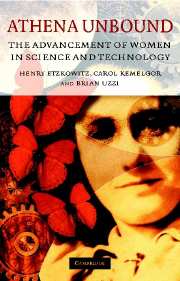Book contents
- Frontmatter
- Contents
- Acknowledgements
- Introduction: Women in science: Why so few?
- 1 The science career pipeline
- 2 Women and science: Athena Bound
- 3 Gender, sex and science
- 4 Selective access
- 5 Critical transitions in the graduate and post-graduate career path
- 6 Women's (and men's) graduate experience in science
- 7 The paradox of critical mass for women in science
- 8 The ‘kula ring’ of scientific success
- 9 Women's faculty experience
- 10 Dual male and female worlds of science
- 11 Differences between women in science
- 12 Social capital and faculty network relationships
- 13 Negative and positive departmental cultures
- 14 Initiatives for departmental change
- 15 International comparisons
- 16 Athena Unbound: Policy for women in science
- Appendix
- Bibliography
- Index
2 - Women and science: Athena Bound
Published online by Cambridge University Press: 08 September 2009
- Frontmatter
- Contents
- Acknowledgements
- Introduction: Women in science: Why so few?
- 1 The science career pipeline
- 2 Women and science: Athena Bound
- 3 Gender, sex and science
- 4 Selective access
- 5 Critical transitions in the graduate and post-graduate career path
- 6 Women's (and men's) graduate experience in science
- 7 The paradox of critical mass for women in science
- 8 The ‘kula ring’ of scientific success
- 9 Women's faculty experience
- 10 Dual male and female worlds of science
- 11 Differences between women in science
- 12 Social capital and faculty network relationships
- 13 Negative and positive departmental cultures
- 14 Initiatives for departmental change
- 15 International comparisons
- 16 Athena Unbound: Policy for women in science
- Appendix
- Bibliography
- Index
Summary
Athena, the Greek mythological figure with strong female and male elements in her identity, personifies the dilemma of the contemporary female scientist. Contemporary female scientists are expected, and often expect themselves, to combine a demanding personal and professional life, without its effects on either. Even as some female scientists struggle to balance their professional and personal lives, others continue or are constrained to comply with a traditional ‘male model’ that rigidly subordinates the personal to the professional. Women in science comprise a diverse set of persons who, despite a common gender, do not embrace a collective identity.
Many successful women in scientific and engineering professions expect to have crossed a threshold into a work life in which gender is irrelevant. These fortunate few females are taken on as apprentices and, encouraged by their undergraduate professors, enter graduate school in the sciences and engineering. There again, they encounter an opaque competitive system that typically depletes their self-confidence.
Those women who complete the Ph.D. face a series of career choices that often needlessly clash with personal aspirations. As Athena found in pursuing her adventures as a woman in a higher world dominated by a male ethos, gender matters.
Alternate competing theses have been suggested to explain the resistance to women in science. It is not ‘either/or’. Rather than ‘barriers to entry’, visible and invisible impediments to women pursuing a scientific career, or a ‘glass ceiling’ that places limits on recognition of achievement, difficulties exist at all stages and phases of the scientific career line.
- Type
- Chapter
- Information
- Athena UnboundThe Advancement of Women in Science and Technology, pp. 15 - 30Publisher: Cambridge University PressPrint publication year: 2000



